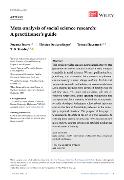Meta-Analysis of Social Science Research: A Practitioner’s Guide

Datum vydání
2024Publikováno v
Journal of Economic SurveysRočník / Číslo vydání
38 (5)ISBN / ISSN
ISSN: 0950-0804ISBN / ISSN
eISSN: 1467-6419Informace o financování
MSM//LX22NPO5101
GA0/GM/GM23-05227M
GA0/GA/GA21-09231S
Metadata
Zobrazit celý záznamKolekce
Tato publikace má vydavatelskou verzi s DOI 10.1111/joes.12595
Abstrakt
This paper provides concise, nontechnical, step-by-step guidelines on how to conduct a modern meta-analysis, especially in social sciences.We treat publication bias, p-hacking, and heterogeneity as phenomena meta-analysts must always confront. To this end, we provide concrete methodological recommendations. Meta-analysis methods have advanced notably over the last few years. Yet many meta-analyses still rely on outdated approaches, some ignoring publication bias and systematic heterogeneity. While limitations persist, recently developed techniques allow robust inference even in the face of formidable problems in the underlying empirical literature. The purpose of this paper is to summarize the state of theart in a way accessible to aspiring meta-analysts in any field. We also discuss how meta-analysts can use advances in artificial intelligence to work more efficiently.
Klíčová slova
meta-analysis, publication bias, p-hacking, artificial intelligence, model uncertainty
Trvalý odkaz
https://hdl.handle.net/20.500.14178/2704Licence
Licence pro užití plného textu výsledku: Creative Commons Uveďte původ-Neužívejte dílo komerčně-Nezpracovávejte 4.0 International






